| |
| |
Caption: Board of Trustees Minutes - 1870
This is a reduced-resolution page image for fast online browsing.

EXTRACTED TEXT FROM PAGE:
3$1 court of last resort, and the chief justice was endowed with omniscience and infinite intelligence, so that every decision should have all the infallibility ever ascribed to the edicts of the Pope, still the result would not pay. No amount of sophistry can convince any rational man that a judgment, however pure and well backed by legal lore, that gives him one hundred dollars at an expense of three hundred, is any protection against the wrong doer or any benefit to him. The law poorly answers the purpose of redressing the wrongs of individuals, and if it was made to enrich the legal profession at the expense of the people, it could hardly have been more adroitly fashioned for that purpose. To the people it is but an ignisfatuus, that flatters but to deceive, that lures but to destroy. I will offer a few suggestions as to a remedy ; I would commence reform (as all reform must be gradual) by revising and extending the jurisdiction of the lower courts, making their action final, and thus stopping nine-tenths of the business now sent to the higher courts. This will relieve the industrial class from nearly all the participation in the expensive, vexatious and unnecessary attendance on the high courts. I would establish a local court in each town, precinct, or ward, with juris* diction over cases amounting to one thousand dollars. I would make it strictly a court of equity and allow no appeal from its decisions; guard its proceedings with all proper provisions for the protection of parties. Let all matters in dispute be promptly and cheaply adjudicated and forever settled. Let it be virtually an enforced arbitration, where all contests shall be settled in the embryo. Such a court, divested of those technicalities, which only bewilder the courts and juries, will seldom do great injustice. A better jury can be found in each town than at the county seat, where professional jurors congregate. The parties and witnesses will be among their neighbors, where they are well known and properly appreciated. The merits of any case will be better understood where the occurrence takes place, and the cost will be trifling^ What is recovered will be net gain, and not swallowed up in costs, as in the higher courts. But, better still, the decision will be prompt, decisive and final—no vexatious delay, no interminable litigation, eating up the substance and bankrupting the parties, and if the parties do not get full justice, there will not be enough left to pay for changing into a higher court, where every dollar recovered will cost from two to ten. It may be objected that these courts and juries will not be learned in the law, and cannot nicely discriminate on all legal points. To this I will answer that they will know what is right, and justice is better than law. Neighbors and companions of the parties, they can, more fully than strangers, comprehend the case, and do to others as they would have and may expect others to do to them. The settlement of all difficulties by such domestic courts will soon establish plain and simple rules of procedure. Text books, embracing terse, short and practical axioms, will soon be produced and become one of the important studies in our common and higher schools. The people will soon become
| |